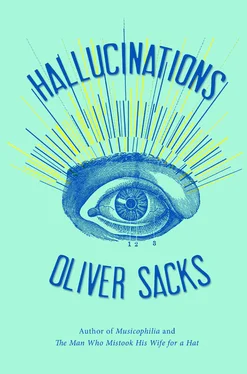Orrin Devinsky, a former student of Geschwind’s, has been a pioneer himself in the investigation of temporal lobe epilepsy and the great range of neuropsychiatric experiences which may be associated with it — autoscopy, out-of-body experiences, déjà vu and jamais vu, hyperfamiliarity, and ecstatic states during seizures, as well as personality changes between seizures. He and his colleagues have been able to perform clinical and video EEG monitoring in patients as they are having ecstatic-religious seizures, and thus to observe the precise coinciding of their “theophanies” with seizure activity in temporal lobe seizure foci (nearly always these are right-sided). 48 48 One such patient, who had very little in the way of religious interests as an adult, had his first religious seizure at a picnic, as Devinsky described to me: “His friends observed at first that he stared, became pale, and was unresponsive. Then suddenly, he began to run in circles for two or three minutes yelling, ‘I am free! I am free!… I am Jesus! I am Jesus!’ ” The patient later had a similar seizure which was recorded on video EEG, and, just before the seizure, Devinsky noted, the patient was slow to respond and disoriented regarding time and place: When asked if there was anything wrong, he replied: “nothing is wrong, I am doing well … I am very happy” and when asked whether he knew where he was, he replied with a smile and a surprised look: “Of course I know. I am in heaven right now;… I am fine.” He remained in this state for ten minutes, then went on to a generalized seizure. Later, he remembered his ecstatic aura “as if it were a vivid and happy dream” from which he had now awoken, but he had no memory of the questions put to him during the aura.
Such revelations may take different forms; Devinsky has told me of one woman who, following a head injury, started to have brief episodes of déjà vu and a strange, indescribable smell. After a cluster of these complex partial seizures, she entered an exalted state in which God, with the form and voice of an angel, told her to run for Congress. Though she had never been religious or political before, she acted on God’s words at once. 49 49 She ran as a Republican in a district that had been Democratic for a very long time, and lost by only a narrow margin. Whenever she appeared in public during her campaign, she said that God had told her to run, and this apparently persuaded thousands of people to vote for her, despite her manifest lack of political experience or skills.
On occasion, ecstatic hallucinations can be dangerous, although this is very rare. Devinsky and his colleague George Lai described how one of their patients had a seizure-related vision in which “he saw Christ and heard a voice that commanded him to kill his wife and then himself. He proceeded to act upon the hallucinations,” killing his wife and then stabbing himself. This patient ceased to have seizures after the seizure focus in his right temporal lobe was removed.
Such epileptic hallucinations bear a considerable resemblance to the command hallucinations of psychosis, even though the epileptic patient may have no psychiatric history. It takes a strong (and skeptical) person to resist such hallucinations and to refuse them either credence or obedience, especially if they have a revelatory or epiphanic quality and seem to point to a special — and perhaps exalted — destiny.
As William James observed, an acute and passionate religious conviction in a single person can sway thousands of people. The life of Joan of Arc exemplified this. People have puzzled for nearly six hundred years as to how a farmer’s daughter with no formal education could have found such a sense of mission and succeeded in getting thousands of others to aid her in an attempt to drive the English out of France. The early hypotheses of divine (or diabolic) inspiration have given way to medical ones, with psychiatric diagnoses vying with neurological ones. Much evidence is available from the transcripts of her trial (and her “rehabilitation” twenty-five years later) and from the recollections of contemporaries. None of these is conclusive, but they do suggest, at least, that Joan of Arc may have had temporal lobe epilepsy with ecstatic auras.
Joan experienced visions and voices from the age of thirteen. These came in discrete episodes lasting seconds or minutes at most. She was very frightened by the first visitation, but later she derived great joy and an explicit sense of mission from her visions. The episodes were sometimes precipitated by the sounds of church bells. Joan described her first “visitations”:
I was thirteen when I had a Voice from God for my help and guidance. The first time that I heard this Voice, I was very much frightened; it was mid-day, in the summer, in my father’s garden … I heard this Voice to my right, towards the Church; rarely do I hear it without its being accompanied also by a light. This light comes from the same side as the Voice. Generally it is a great light.… When I heard it for the third time, I recognized that it was the Voice of an Angel. This voice has always guarded me well, and I have always understood it; it instructed me to be good and to go often to Church; it told me it was necessary for me to come into France … it said to me two or three times a week: “You must go into France.” … It said to me: “Go, raise the siege which is being made before the City of Orleans. Go!” … and I replied that I was but a poor girl, who knew nothing of riding or fighting.… There is never a day when I do not hear this Voice; and I have much need of it.
Many other aspects of Joan’s putative seizures, as well as evidence of her clarity, her reasonableness, and her modesty, were explored in a 1991 article by the neurologists Elizabeth Foote-Smith and Lydia Bayne. While they present a very plausible case, other neurologists disagree, and one cannot hope to see the matter definitively resolved. The evidence is soft, as it must be for all historical cases.
Ecstatic or religious or mystical seizures occur in only a small number of those who have temporal lobe epilepsy. Is this because there is something special — a preexisting disposition to religion or metaphysical belief — in these particular people? Or is it because the seizure stimulates particular parts of the brain that serve to mediate religious feeling? 50 50 The evidence here has been discussed in a number of books, including Kevin Nelson’s The Spiritual Doorway in the Brain: A Neurologist’s Search for the God Experience . It is also the theme of a novel, Lying Awake , by Mark Salzman; the protagonist is a nun who has ecstatic seizures in which she communes with God. Her seizures, it turns out, are caused by a tumor in her temporal lobe, and it must be removed before it enlarges and kills her. But will its removal also remove her portal to heaven, preventing her from ever communing with God again?
Both, of course, could be the case. And yet quite skeptical people, indifferent to religion, not given to religious belief, may — to their own astonishment — have a religious experience during a seizure.
Kenneth Dewhurst and A. W. Beard, in a 1970 paper, provided several examples of this. One related to a bus conductor who had an ecstatic seizure while collecting fares:
He was suddenly overcome with a feeling of bliss. He felt he was literally in Heaven. He collected the fares correctly, telling his passengers at the same time how pleased he was to be in Heaven.… He remained in this state of exaltation, hearing divine and angelic voices, for two days. Afterwards he was able to recall these experiences and he continued to believe in their validity.… During the next two years, there was no change in his personality; he did not express any peculiar notions but remained religious.… Three years later, following three seizures on three successive days, he became elated again. He stated that his mind had “cleared.” … During this episode he lost his faith.
Читать дальше












